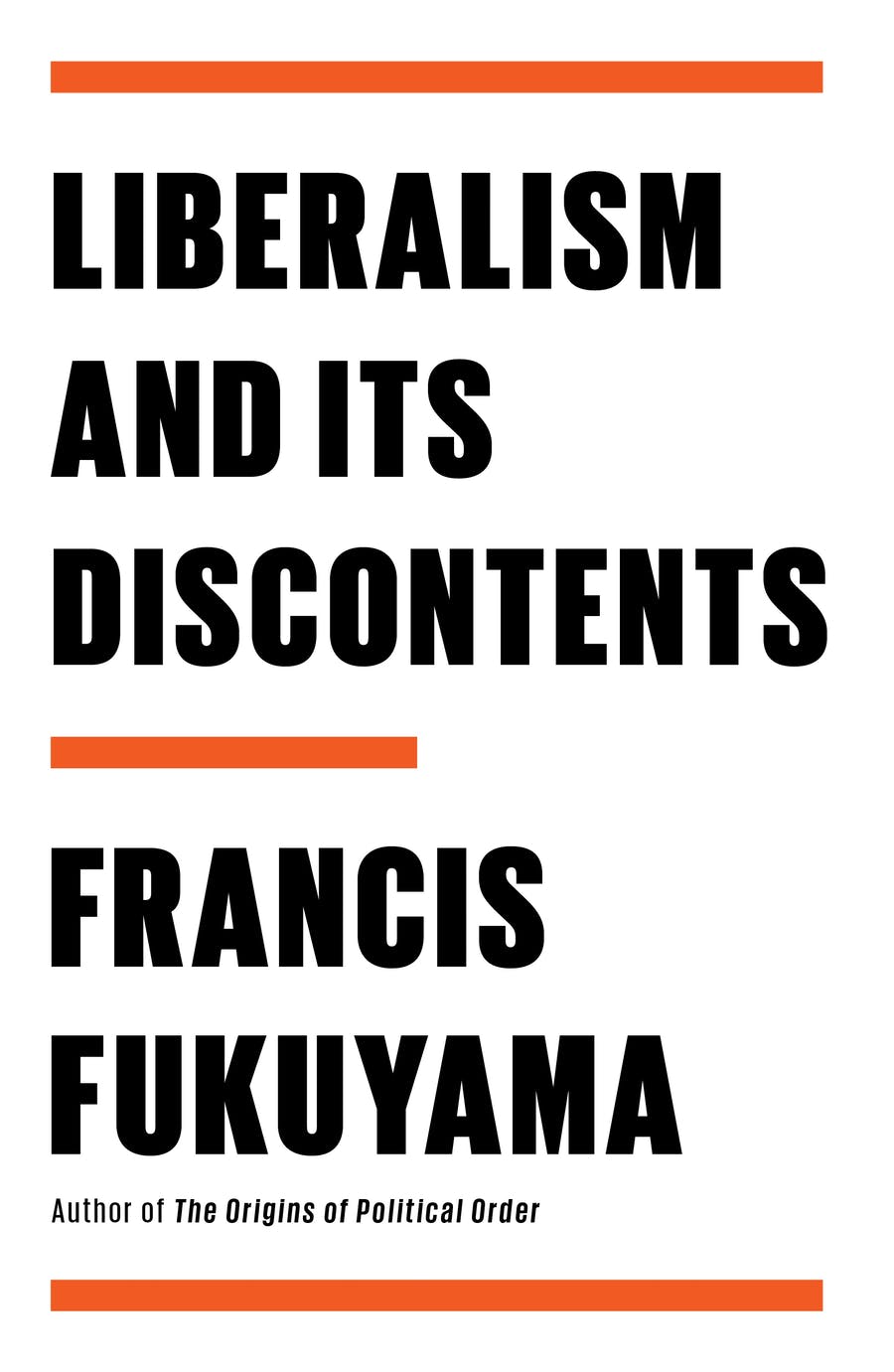Tertullian's CornerA Book review of Liberalism and Its Discontents, by Francis FukuyamaBy Rosa Martha Villarreal There wasn’t a more opportune time for the publication of Francis Fukuyama’s book Liberalism and Its Discontents (Farrar, Straus and Giroux 2022) than now with the January 6th Congressional Committee hearings. The events of January 6th, reminded us that our constitutionally based system is not immune to the machination of those who wish to usurp the liberal order, which has been in place since the United States ratified the Constitution in 1788. Today, illiberal partisans speciously claim that they are actually defending the Constitution, but Fukuyama forcefully refutes those claims. In this book, Francis Fukuyama does not detail the historical rise of Liberalism. As he states, there literally thousands of books which do just that. Rather he focuses on the justifications of an institutional-based liberalism, a system of governance in which the body politic gives it consent to be governed by a strong state restrained by laws because, as Thomas Hobbes posits, the unifying human passion is not religious belief but fear of violent death. Before he delves into the justifications for liberalism, Fukuyama begins his book with an important caveat: "By 'liberalism,' I refer to the doctrine that first emerged in the second half of the seventeenth century that argued for the limitation of the powers of governments through law and ultimately constitutions, creating institutions protecting the rights of individuals living under their jurisdiction. I do not refer to liberalism as it is used today in the United States as a label for left -of-center politics; that set of ideas, as we shall see, has diverted from classical liberalism in certain critical ways." (vii) [ Italics mine] Fukuyama states that the justifications of a liberal society are that liberalism:
Fukuyama explains that there is an inevitable the tension between the idealism of classical liberalism and its actual practice. In the last 30 years this tension has been exacerbated by the economic inequalities wrought by Neoliberalism. First of all, economic inequality is not new as economic liberalism has always been predicated strong property rights. Property rights were central to the historical rise of liberalism since the philosophy’s creators and early practitioners were property-owning, middle-class individuals, the bourgeoise. And here lies an inevitable tension since, as Madison posits in The Federalist No. 10, this leads to a rise of social classes and a source of inequity, which subsequently caused the rise of Marxism. Recently, this on-going tension has been exacerbated by Neoliberalism. Neoliberalism, the economic school of thought led by Milton Friedman, Friedrich Hayek, et al, also called the University of Chicago or Austrian School of Thought, reasoned that deregulation, privatization, free trade, and higher immigration would maximize economic growth by allowing a free exchange of good, service, and workers. These changes would result in more competition which in turn would lower consumer prices. The free flow of labor would also contribute to lower priced consumer goods. Neoliberal policies, as Friedman et al predicted, brought a boon of innovation and creativity. These neoliberal policies represented the positions of not only conservative leaders like Ronald Reagan and Margaret Thatcher but left-center leaders like Bill Clinton and Tony Blair. But as Fukuyama points out, Neoliberalism’s shortcomings have had devastating, unintended consequences. First, the theory is predicated on consumerism, and yes, goods became cheaper and the economy was more efficient. However, jobs were outsourced and wages stagnated. Deregulation of capital controls, which had been instituted in the 1930s, precipitated the financial crisis of 2008. There were also global political consequence in places like Russia after the fall of the Soviet Union where the economic system went from central planning to none, precipitating the rise of corrupt oligarchs and Vladimir Putin’s dictatorship. In sum, although less regulated Capitalism did create enormous wealth, it did not create a healthy society for everyone. "They [neoliberals] failed to understand that markets themselves function only when there they are strictly regulated by states with functioning legal systems that have the capacity to enforce rules concerning transparency, contracts, ownership, and the like." (23) Additionally, good paying jobs for low skill workers were outsourced and job retraining programs failed to materialize. "Many neoliberals supported open immigration, again on the grounds that allowing labor to move to the point of greater demand would lead to greater efficiency They were again correct in thinking that labor mobility would improve aggregate welfare, but paid less attention to its distributional consequences and the social backlash it would inspire." (25) Besides intensification of anti-immigration vitriol, another consequent is the justifiable resentment against the gross disparities in income distribution. Fukuyama asserts that the average workers hurt by these policies do not find solace that workers in other countries or immigrants are better off at their expense. And I may add, I doubt they find it celebratory every time billionaires in over-sized, buffoonish cowboy hats take a ride into outer space. Fukuyama attributes the flaws of neoliberalism to oversimplification, a religious-like ideological fervor, and a misreading of human nature. On their own, capitalists will horde wealth because capitalists are humans and greed is part of human nature, which is why regulations are needed. Capitalism has overall elevated the wealth of many societies. But even when capitalism can benefit a large number of people, the beneficiaries react emotionally. They value cultural signifiers over affordability, best characterized by not wanting a Starbucks to replace a familiar café; they act in their self-interest; and desire the dignity of work. The backlash against immigrants, the rise of populism, and dangerously, the desire to “return” to an imagined idealized past threatens the very core of our social contract, the social order, the right to human dignity and self-determination as the disenchanted ones are willing to resort to violence. Adding to the discontent wrought by neoliberalism is the rise of illiberal ideologies on both the Right and the Progressive Left. This is abetted by technology and the flow of unvetted claims, conspiracy theories, and outright fake news. The distrust of empiricism, disdain of facts, and “motivated reasoning,” i.e., finding selective data to support an a priori doctrine, produces a limitless source of charlatans, grifters, and opportunistic politicians. On the Left, what started as a noble quest for equality for all in the social compact such as the sexual contract, correcting “the most rapacious forms of capitalism” (74) and the debunking of the assumed cultural superiority of Western culture, devolved into an obsession with group identity and irrational policing of speech. While Right-wing politicians demagogue the threat of Marxist Critical Theory or simply Critical Theory, it remains an exercise in the domain of academic political, sociological, and literary criticism. In other words, Critical Theory and Post Structuralism are intellectual exercises and not a mechanism of governance. It is true that Critical Theory is fixated with perpetual victimhood, historical power relationships, and stubborn focus on past wrongs, but it is not a danger to the social order because it does not advocate the imposition of a totalitarian system of governance. If anything, says Fukuyama, Progressive Leftism leans more towards anarchy. Thus, the Leftist program can be annoying if not downright silly, but it is not a threat to the liberal social order. The existential threat to the civil order and the individual’s right to self-autonomy comes from the Right, says Fukuyama. Although the Right appropriated the Far Left’s disdain of facts and fixation with (in their case, white) identity politics, they never intended to defend the liberal order but preserve their own power in a zero-sum game where the triumphalist narrative of White American Exceptionalism remained dominant even at the expense of depriving some citizens of their full rights. However, if there ever was a constant, said Heraclitus of Ephesus, it is change. Modernity and liberalism disrupted the traditional ideas of “religiously based morality” and especially its regulations of sexual behavior. Fukuyama correctly states that the antipathy to change is not a particularly a Christian phenomenon but applies most of the major faiths around the world. Traditional nationalism, too, has diminished as more and more educated people identify with like-minded people around the world. This cosmopolitanism is disdained by the American Right as un-American. "In some corners of the American Right, unwillingness to tolerate diversity extends not only to fellow citizens of the wrong race, ethnicity, or religion, but to broad groups of people who actually constitute a majority of the population." (118) Here Fukuyama quotes Glenn Elmers of the Claremont Institute that even liberally inclined white Americans are not considered real Americans by the Right but rather “citizen aliens” (118). The Right is dangerously willing to use state power and violence to impose their ideological vision of a 19th century America and coerce others into their definition of Americanism. They fail to see that the changes they are so threatened by are manifestations of the political evolution that sought to fulfill the promise of liberalism, which is freedom and equality for all as the Pledge of Allegiance says. In his last two chapters, “National Identity” and “Principles for a Liberal Society,” Fukuyama refutes the criticisms of liberalism from the Left and the Right. "Progressives for their part will have to accept the fact that roughly half the country does not agree with either their goals or their methods, and they are unlikely to simply overpower them at the ballot box anytime soon. Conservatives need to come to terms with the country’s shifting racial and ethnic mix, the fact that women will continue to occupy the fullest range of positions, both professionally and privately, and that gender roles have changed profoundly. Both sides quietly entertain hopes that a large majority of their fellow citizens secretly agree with them and are prevented from expressing this agreement only through media manipulation and false consciousness propagated by various elites. This is a dangerous dodge that simply allows partisans to simply wish diversity away. Classical liberalism is needed more than ever today, because the United States (as well as other liberal democracies) are more diverse than they ever were." (146) Finally, Fukuyama argues that there are no other just governing alternatives to liberalism; that its perceived weaknesses—its institutions of checks and balances that slow the implementation of new legislation, its deconstruction of the old binds of traditionalism and religion, its impersonality--are its strengths. A liberal society creates order while simultaneously protecting its citizen from external threats by “creating a powerful state, but then constraining that power under the rule of law” (130). More than ever, the principles of liberalism need to be affirmed and strengthened. This takes hard work--freedom isn’t free. We must take certain steps to safeguard liberalism and here is why. First, there is a need for government because it provides critical public services. The size of government is not the critical issue but the its quality and its impersonality, i.e., it must treat citizens as equals. This government, moreover, must be manned by well-educated professionals. Second, a quality government must regulate the economy but not hinder its growth engine and creative incentives in the process. But there must be a degree of regulation and income redistribution to protect against political backlash and unrest. Additionally, to secure the domestic peace, the government and liberal institutions must guard against “state rights” that seek to alienate citizens from their rights by hindering their access to the ballot box, gerrymandering, and, now, forcing women to give birth. Third, free speech needs to be defended because free thought is implicit with speech. However, there are limits because of norms and empirical facts. Furthermore, free speech originates with the right to privacy. There is no “right way to think,” contrary to what the Right and the Progressive Left posit. Finally, the rights of the individual take primacy over the cultural rights of groups because individualism is a universal value and not a construct of Western culture. Rather individualism is a by-product of socio-economic modernity, be it in Western Europe or South Korea. Although we members of groups based on heritage, ancestry and such, we have individual agency, and individual agency takes precedence over the group. Fukuyama closes his book with the admonishment for the political leadership and its individual citizens to distance themselves from extremism. As the ancient Greeks said: “nothing in excess” (154). "Moderation implies and requires self-restraint, the deliberate effort not to seek the greatest emotion of the fullest accomplishment. Moderation is seen as an artificial restraint on the inner self, whose full expression is said to be the source of human happiness and achievement." (154) This book is a timely reminder of principles of the nation and why those principles are under attack and must be defended. Fukuyama reminds his readers that the nation was founded on the philosophy of classical liberalism not a specious White nationalist narrative as espoused by the Right nor the victimhood narrative of the Left. It’s accessible writing and straight-forward argumentative style make for a quick but dense, thought-provoking reading and one that every citizen should read.  Rosa Martha Villarreal, recently retired as an Adjunct Professor at Cosumnes River College in Sacramento, California, is author of several important novels including Doctor Magdalena, The Stillness of Love and Exile, and Chronicles of Air and Dreams. The name for her column, Tertullian’s Corner, comes, she says, from the time when liberal, i.e., free thinking, people were persecuted by the Catholic Church. So young men (and women) would gather in some corner of a monastery under the pretense of discussing the Church Father, Tertullian. Thus, the tertulia was born.
1 Comment
|
Archives
June 2024
Categories
All
|
Donate and Make Literature Happen
is published by the Somos En Escrito Literary Foundation,
a 501 (c) (3) non-profit, tax-exempt corporation. EIN 81-3162209



 RSS Feed
RSS Feed